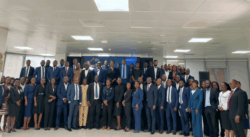The coronavirus (COVID-19) has presented enormous challenges to the developed, emerging, and developing economies. The COVID-19 has revolutionized international trade, thereby initiating businesses into a new era of trade facilitation.
The modern era of international trade is one of the increasingly complex interactions between organizations, firms, and people. Countries that have successfully simplified and modernized their trade systems and procedures are perceived to have increased trade flows (imports and exports), maximize their revenue collection, and have improved the effectiveness and efficiency of their customs administration.
Effective trade facilitation systems result in improved customs duties revenues for Governments and enhanced border control and fraud prevention. Implementing better trade facilitation systems for developing countries like Ghana may increase the contribution of trade to overall economic growth and development of the country.
Over the years, Ghana has fully complied with the World Trade Organization’s (WTO’s) agreement on trade facilitation. WTO’s agreement on trade facilitation is to expedite the movement, release, and clearance of goods at the port.
The agreement addresses issues about slow customs clearance and reduces the cost of exports, imports, and transit trade clearance procedures. Ghana has implemented some of the provisions in the Trade Facilitation Agreement (TFA) with the introduction of paperless systems and the reduction of the number of inspection agencies at our respective ports. Irrespective of the compliance efforts taken by Ghana to meet WTO’s agreement on trade facilitation, some challenges are facing our port operations in this COVID-19 era.
Recently, the Finance Minister hinted that revenue generated from taxes on goods imported from other countries yielded only GH¢829.71 million in the first quarter of this year, 34 percent short of the initial estimated target. This is against a target of GH¢1.26 billion, a shortfall of GH¢427.55 million which represents 34.01 percent, according to a provisional fiscal data released by the Ministry of Finance (MoF) last week.
Revenues collected from the import of goods also declined by 42.47 percent against the GH¢1.44 billion recorded for the same period in 2019. While suffering from revenue shortfall, the country also granted import exemptions of GHȼ43.08 million to foreign companies and other institutions in the first quarter of 2020. This development threatens the government’s annual revenue target of GH¢5.81 million from import duties.
It is inequitable to highlight that Ghana failed to achieve its import duties target due to the COVID-19 pandemic. Perhaps, Ghana would have missed the import duties target anyways as there are no scientific and data-driven based facts to justify that the COVID-19 pandemic has resulted in reduced import duties.
However, it is reasonable to assert that the COVID-19 pandemic has had an adverse impact on Ghana’s revenues generated from taxes on goods imported into the country. On a psychological and behavioral perspective of importers, it is fair to argue that the COVID-19 pandemic may have caused importers to limit the goods and services brought into the country due to the recent partial lockdown on movements. A reduction in import-led trade flows is likely to threaten annual revenue target from import duties. In an attempt to revive the ailing economy, Ghana has outlined stimulus packages to stimulate the economy.
For instance, a GH¢600 million soft loan stimulus package is to be disbursed to Small and Medium Enterprises (SMEs). However, from a broader perspective, import-related businesses should not be overlooked in the disbursement of such stimulus packages.
From a technical perspective, the Centre for International Maritime Affairs, Ghana (CIMAG) has identified two proposed measures required to increase revenues generated from taxes on goods imported into the country.
- Comprehensive system reforms at the ports
Comprehensive system reforms with technology-based solutions infused under the current port management systems will help maximize revenues generated from taxes of goods imported into the country. The government decision to replace the National Single Window process for international trade facilitation, and its operators, with the new and current system, named Integrated Customs Management System (ICUMS) was welcomed with a myriad of responses.
The seemingly creative and innovative ICUMS end-to-end system was introduced to address revenue leakages by improving efficiency and curbing corruption at our ports. However, the newly end-to-end system is still being managed manually. A manual system may be characterized by underreporting and under the collection of import duties. Without complete system reforms at the ports, Ghana’s target on revenues generated on goods imported remains unattainable.
- Reforming tax exemptions regime
The government must note that the current environment is not conducive to support blanket exemptions to foreign companies. An assessment of tax exemptions is required to ensure that the sectors likely to drive the economy during the COVID-19 era are supported and not just foreign companies and institutions. To increase revenues generated from the import of goods, tax exemptions must be rolled-out on a cost and/or benefit analysis with special importance attached to sectors deemed to drive the economy to a sustainable and resilient future.
ALBERT DERRICK FIATUI is the Executive Director at the Centre for International Maritime Affairs (CIMAG). He holds a bachelor degree in Integrated Development Studies from the University of Development Studies. He holds an LLB (Law) from the Mountcrest University College and a postgraduate certificate in Health Safety & Environment. He holds a certificate of proficiency in customs procedures & port operations. Currently, Albert is a Director in charge of Business Development at the Logical Maritime Services Limited, a privately held global logistics company. With extensive research, policy and advocacy backgrounds’, Albert serves on numerous boards within the maritime industry. E-mail: [email protected].
BISMARK AMEYAW (Ph.D.) is the director of research and advocacy at the Centre for International Maritime Affairs (CIMAG). He is a director of international relations and research development at the African Center for Strategic Business and Entrepreneurship Development (ACSBED). He specializes in modeling and forecasting the dynamic links in energy, economics, and the environment. He also takes a keen interest in the Ghana maritime industry and entrepreneurship development. He writes, teaches and consults on energy and maritime-related issues. He serves as an editorial board member and a reviewer for several Zone A academic journals. E-mail: [email protected]; [email protected].










